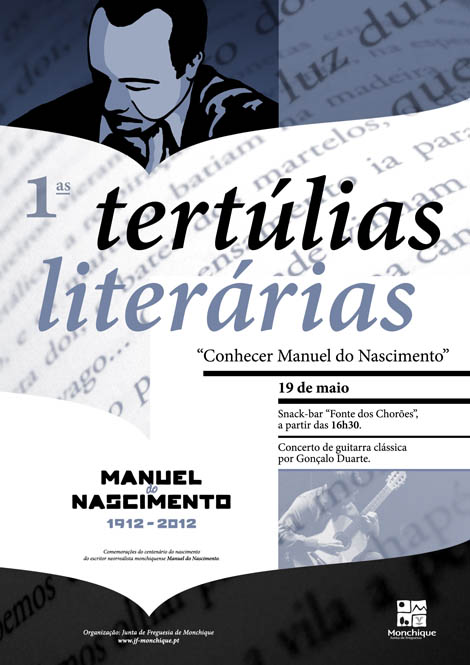 The Parish Council of Monchique marks the centenary birth of the writer Manuel do Nascimento, a figure of the neorealist trend and XNUMXth century Portuguese literature, born in Monchique, promoting a cycle of three literary gatherings dedicated to the dissemination of his life and work.
The Parish Council of Monchique marks the centenary birth of the writer Manuel do Nascimento, a figure of the neorealist trend and XNUMXth century Portuguese literature, born in Monchique, promoting a cycle of three literary gatherings dedicated to the dissemination of his life and work.
The first of these gatherings will take place next Saturday, May 19, at 16:30 pm at the Fonte dos Chorões snack bar, right in the center of the village of Monchique.
On the theme "Meeting Manuel do Nascimento", these first gatherings aim to place the writer in the national literary scene, revealing some of the most intimate, less understood and lesser-known traits that, throughout his short but fruitful artistic career, shaped the strong personality and the virtuous work of the writer.
"Meeting Manuel do Nascimento" is an opportunity to revisit not only one of the most misunderstood and ignored talents in national literature, but also to understand the actuality of his writing as an element for overcoming man and the main problems with which humanity is confronted. debate.
Who was Manuel do Nascimento?
Born in Monchique on December 27, 1912. Coming from a family of merchants, he studied at an Industrial Institute, where he completed a course in Chemistry.
The first shock to real life takes place in Trás-Os-Montes, in a mine where he will practice his profession. The contact with the life and problems of the miners makes him live in a permanent struggle with himself, awakening in the future writer a yearning for justice that the troubled period of his youth had ignored.
He leaves the mine because he is ill, and it is during the period of convalescence in his native land that he begins to rehearse his first steps as a writer.
Once cured, he returns to the city, where he meets unemployment and the harshness of the struggle for life. All of his work highlights his qualities as a writer who is part of the neorealist stream, giving him a prominent place in modern Portuguese literature.
Bibliography:
I Wanted to Live (novel) – 1942
Mineiros (novel) – 1944
Steel Changed Temper (novel) – 1946
The Last Show of the Monumental Circus, in Contos e Novelas, 1948
Agony (novel) – 1954
The Last Show (tales) – 1955
Stories of Miners (narratives) – 1960
Encounters (1st vol.) (Interviews) – 1961
Nothing of Importance (story taken from The Last Show) – Col. Novela, nd
Suspicion (story extracted from The Last Show) – Col. Mosaico, nd


















Comments